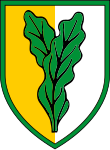Homeland Security Command 14
|
Homeland Security |
|
|---|---|
 Association badge |
|
| active | April 1, 1974 to April 1, 1981 |
| Country |
|
| Armed forces | armed forces |
| Armed forces |
|
| Type | Homeland Security Command |
| Insinuation |
|
| Staff seat | Lingen |
| commander | |
| Last commander | Colonel Helmut Feher |
The Heimatschutzkommando 14 was a partially active Heimatschutzkommando of the army of the German armed forces with the headquarters of the staff last in Lingen . The association was planned in 1974, dissolved in 1981 and was subordinate to the Commander in Defense Area II .
history
Lineup
The Homeland Security Command was set up on April 1, 1974 to take Army Structure III as a partially active unit in Defense Area II with staff in Munster . In March 1976 the staff moved to Lingen
The homeland security command was one of the six partially active homeland security commands of the territorial army . Only part of the Homeland Security Command was present at peace. In the event of a tension defense , the homeland security command was able to grow up significantly thanks to reservists . Some of the subordinate battalions and companies were planned as inactive units that would only have been mobilized in the event of a defense . For this purpose, their defense material was stored in depots during peacetime or had to be withdrawn from civilian stocks as a material mob supplement .
The task of the homeland security command, which formed the core of the homeland security force of the territorial army , was, among other things, the defense of the rear army area , in particular the security of important infrastructure such as marching routes, ports, traffic hubs and telecommunications facilities. Airborne troops , sea-landed , leaked or breached enemy had to be expected in the rear area . At its core, the Homeland Security Command resembled a fighter brigade . Mobility and firepower remained by the lack of armored vehicles , artillery systems and independent companies of combat support and guide troops but well behind the brigades of the Army back so that the Homeland Security Command only temporally and spatially tightly limited combat missions could perform and combined arms battle only was conditionally qualified.
In times of peace, the subordinate training centers trained soldiers from the Homeland Security Force .
resolution
To take over the Army Structure IV , the Homeland Security Command was decommissioned on April 1, 1981. Personnel and material of the decommissioned Homeland Security Command were used to set up the partially active Homeland Security Brigade 52 .
structure
The homeland security command was divided into:
-
Staff and staff company ( Munster , Lingen from 1976 ) (cadre)
-
41st Fighter Regiment
- Jägerbataillon 411 (active)
- Jägerbataillon 412 ( Ochtrup ) (equipment unit)
- Panzermörserkompanie 410 (device unit)
- 2 tank destroyer companies (equipment units)
- 42nd Fighter Regiment
- 1 light engineer battalion (equipment unit)
- Supply Battalion 14 ( Ochtrup ) (equipment unit)
- Field Replacement Battalion 14 ( Lingen ) (equipment unit)
- several training centers
- Hunter training center 141 ( Schwanewede )
- Hunter Training Centers 144
- Hunter training centers 22/1
- Hunter training center 24/1 ( Loccum )
- Resupply Training Center 720 ( Walsrode )
-
41st Fighter Regiment
Association badge
The homeland security command carried a union badge with the following blazon :
- "Green rimmed , divided of silver and gold, an upright green oak branch with two leaves ."
The association badge established the connection to the stationing room. The shield division was similar to the flag of the Kingdom of Hanover and the State of Hanover . The oak leaf was a traditional symbol of the German army. The upright oak branch was a symbol that was often encountered, especially around the hunters' troops . It was similarly shown in the troop badge of the hunter troop . The green board was typical for all homeland security commands in Army Structure III . Green was the weapon color of the hunter troop , because most homeland security commands were essentially similar to the hunter brigades.
The association badge was continued by the "successor association" Heimatschutzbrigade 52 .
Commanders
The Homeland Security Command was commanded by the following staff officers :
- Colonel Ulf Mühlbacher (April 1, 1974 - March 31, 1979)
- Colonel Helmut Feher (April 1, 1979 - March 31, 1981)
Web links
- Homeland Security Commandos / Homeland Security Brigades. German Digital Library, accessed on July 2, 2018 .
Individual evidence
- ↑ Homeland Security Commands / Homeland Security Brigades. German Digital Library, accessed on July 2, 2018 .
- ↑ Nemere: Jägerverband u. units of the Bundeswehr. Post # 13. In: Cold War Forum - Military facilities & relics of the Cold War. November 29, 2008. Retrieved August 8, 2018 .
Coordinates: 52 ° 31 ' N , 7 ° 18' E